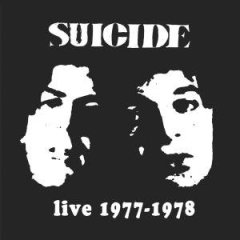It’s rare to find live albums from canonical acts that don’t come swathed in mythology or creaking under the weight of their own self importance. A release of the Sex Pistols at the Lesser Free Trade Hall, for instance, would surely be accompanied with the five hundred screaming voices of those who weren’t there but claim to be edited in on top, and a chattering clockwork toy of Paul Morley. What’s so thrilling about Suicide’s ambitious five disc box set, then, is the purity of the presentation. These recordings, made on a simple hand-held device, have not been tinkered with in any way. They remain a warts and all artefact of Suicide’s struggle against at best indifference, at worst, outright hostility.
Suicide’s debut album is, in studio form, a concise attack, seven vicious tracks of streamlined and hissing electronic malevolence, the moment rock & roll was reinvented for a cold, hard, computer age. But it took years for that stunning record to see the light of day. It was built, largely, from the fragmented sets of cheap drum machine and organ noise with which Martin Rev and Alan Vega antagonised New Yorkers from their earliest shows back in 1971.
But in these recordings of 13 concerts between 1977 and 1978 there’s no sign of an act slipping into a comfort zone of playing the album after finally achieving some degree of recognition. These are discordant, terrifying pieces of confrontational music and performance art – Vega’s presence, as a psychotic, motorbike chain-wielding skid row Elvis, is as tangible as if this were an HD DVD. The organ is played as if by a demented geriatric during a blitz, stained glass and icons falling about him. The drum mechanicals crackle and fizz as sodium scattered into water. Sometimes the songs are entirely unrecognisable. You can see how the chirpy drum beats and distracted melody of ‘Cheree’ (introduced as "a love song from New York City") really got up the noses of the crowd at London MusicMachine on July 24th, 1978. "Get off" shouts one punter before the show has even begun. "This is awful", another mutters within recording distance of the microphone. Yet at the end of the gig, amidst the angry shouts, applause can be heard.
At the heart of the box set is the recording of Suicide’s gig in Brussels on June 16th, 1978 that first saw light of day on the infamous 23 Minutes Over Brussels bootleg. The ugliness of the crowd seeps from the speakers, the angry booing and the football chants doing battle with Vega and Rev as they struggle valiantly on against the room of furious Belgians. Yet, as Alan Vega explained to me in a recent interview, just a little while later everything changed. “I looked up and all these people were dancing, dancing to Suicide,” he told me of the gig in Edinburgh where the tide began to turn. “I thought, oh fuck, what am I going to do now? My career is over. Before, I was a guerrilla, a provocateur, but I’d turned into an entertainer overnight.”
This box set is the narrative of Suicide’s slow and painful arrival at a place of acceptance amidst dunderhead punks terrified of anything not delivered by guitars. Even more, it’s akin to unearthing an early and long-forgotten blueprint for what was to come. Alan Vega has said the dressing rooms of that first British tour were full of eager kids who’d later go on to form bands like Soft Cell and Haircut 100. That’s not to mention Suicide’s influence on what would become industrial, avant-garde electronica, techno, you name it. Some might argue that, in its raw and primitive form, this box set is an indulgent catalogue of unpleasant noise and vituperative ranting. I’d disagree. Beauty is in the eye of the beholder and, in this incredible record of a unique time, Suicide are heard taking accepted norms of music and rock & roll to pieces, and creating something violent, bleak, uplifting, intense, and new.


